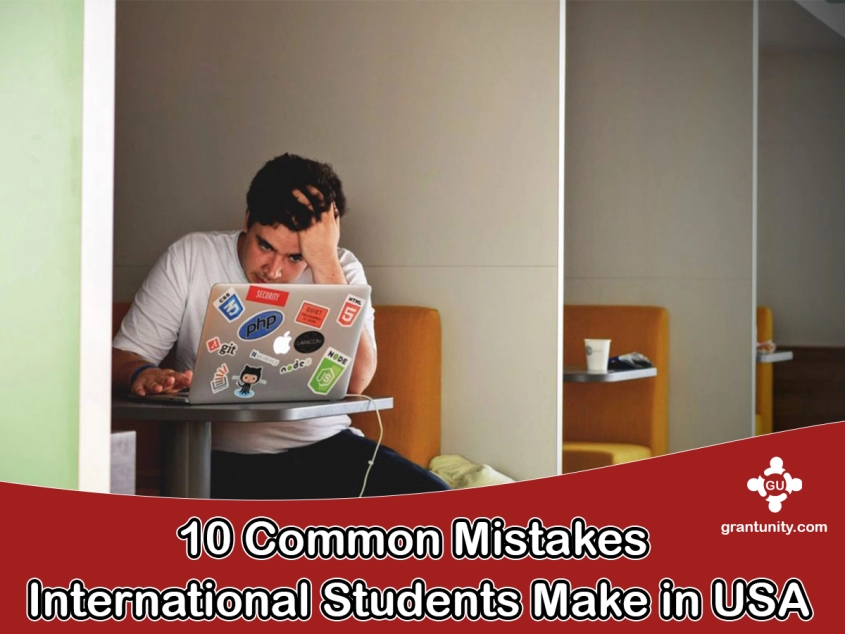10 Common Mistakes International Students Make in USA
International students usually spend their first year at an international university adjusting to their new environment. Being away from home and experiencing culture shock can be quite overwhelming. Most international students tend to make common mistakes during this period of uncertainty. To help avoid these mistakes, here’s a list of errors that international students frequently make along with advice on how to avoid them.

Missing Out on the Orientation
Most international students make the mistake of skipping orientation. Your university’s orientation serves the purpose of familiarizing you with all the key locations on campus. Along the way, all of these things—learning about the exciting courses offered, meeting other students, and getting to know faculty members—will be of assistance to you. Make sure to attend the Orientation to feel more at ease in this new setting.
Not Harnessing Your English Skills
To have a smooth and successful stay while studying in the US, it will be crucial to possess a strong command of both spoken and written English. By reviewing English grammar books, conversing with American students and professors to improve pronunciation, and reading more books to improve diction, you maximize your skill.
Keeping Away from Campus Activities
Engaging in extracurricular activities is crucial to forge strong relationships with your classmates. It can also be a great way to meet new people and give you a break from studying. Therefore, be sure to join the clubs that interest you because you will learn many useful skills and find them very engaging.
Skipping Out on Social and Professional Networking
Engaging in extracurricular activities is crucial to forge strong relationships with your classmates. It can also be a great way to meet new people and give you a break from studying. Therefore, be sure to join the clubs that interest you because you will learn many useful skills and find them very engaging.
Not Utilizing Available Resources
Your professors are your most important resource while attending the university, as highlighted in the aforementioned pointer. They possess a wealth of information and experience in their study area, and when they share it with you, it will help you advance and develop. Therefore, take advantage of the professors’ office hours to stay on top of your learning process and receive individualized tutoring.
Not Having a Plan/Schedule
If you don’t want to rush to finish assignments at the last minute, make sure your schedule for the semester is in line with your syllabus. You can manage important deadlines and extracurricular activities and take time for yourself all at once if you have a plan that is well-curated and prioritized.
Not Keeping Track of Expenses
I want to emphasize again how important it is to make a schedule or plan. You should also set a budget limit. Spending on non-essentials should be avoided; instead, save money. Remember that used textbooks are available on Amazon and even eBay if buying books is eating up most of your budget. Additionally, ask your alumni friends for a loan.
Comprising on Health and Nutrition
Being a college student can be very stressful, particularly if you have a lot of deadlines approaching. But even in stressful times, never sacrifice your mental and physical health. Create a self-care routine that includes yoga, meditation, or your favorite form of exercise. Stay hydrated all day long, and don’t forget to use any campus gyms that may be available.
Not Exploring Your Area
Being a college student can be very stressful, particularly if you have a lot of deadlines approaching. But even in stressful times, never sacrifice your mental and physical health. Create a self-care routine that includes yoga, meditation, or your favorite form of exercise. Stay hydrated all day long, and don’t forget to use any campus gyms that may be available.
Shying Away from Asking for Help
Finally, don’t be afraid to ask questions if you have any doubts. Remember that many resources are available to you for assistance and that doing so may help you establish long-lasting relationships with other students, teachers, and your counselor.
Finally, remember that you will make mistakes as an international student, but you will eventually grow from them and succeed!
Frequently Asked Questions: 10 Mistakes International Students Make in USA
The perception that foreign universities are expensive is widespread, but with scholarships, this is a blown-out concern. Many people overlook the importance of time and effort. The average salary earned by students who attend Indian colleges is less than that of their Western counterparts. Since employers frequently consider your prior salaries during compensation appraisals, this salary sets the tone for all upcoming promotions. Additionally, people with an international outlook from exposure to different cultures are more likely to land senior positions. Finally, studying abroad is a fantastic learning opportunity that enhances students’ academic and soft skills development.
Yes, one of the most popular places to study abroad is the United States—concerns about studying abroad. Visit Grad-Dreams to speak with a free study-abroad expert.
Universities also offer graduate degrees, whereas colleges only offer undergraduate degrees, though the terms are frequently used interchangeably.
Generally, you must be at least 17 years old and a high school graduate.
With breaks for holidays, the academic year typically lasts from August through May. Most universities either follow the quarter system, in which students attend three out of four terms, or the trimester system (two terms per quarter) (three terms).
Following high school, undergraduate programs can result in a bachelor’s degree (four years) or an associate’s degree (two years). Following a bachelor’s degree, graduate programs can lead to a master’s or doctoral degree.
A two-year program called associates can prepare students for a particular career or a bachelor’s program. A bachelor’s degree is earned after four or five years of study in various courses.
A two-year master’s degree offers more specialization. A doctorate is a five to eight-year program that qualifies the graduate as a professor or research scholar.
Yes, but only if you can handle a rigorous course load over six years of study and are highly selective.
When enrolled in a joint-degree program, students start a graduate program in their fourth year of college and graduate with both degrees.
One to two years are usually required for MBA programs.
International students may work up to 20 hours per week on campus with permission from the International Student Office during their first year and may apply to work off-campus in subsequent years.
There is essentially no difference
Distance education is used when a student and an instructor are located in different locations. Learning can occur through mail, phone, internet, or other channels.
Yes, but you might drop some credits and need more time to finish your degree.
You must meet the prerequisites for freshmen applicants and any extra requirements set forth by the transfer institution.
The first two years of a four-year undergraduate degree are typically provided by community colleges, typically supported by the state.
Community colleges offer more affordable tuition, streamlined admissions procedures, strong ties to public universities, and many degree prerequisite courses.
The transfer procedure is different for every school. It is best to start thinking about the four-year school early and figure out what is required to transfer.
To learn which colleges and universities are renowned for excellence in specific academic fields, consult college and university directories.
To ensure that you can read, write, and speak English fluently, American universities require an English language proficiency test before admission.
In addition to local options, there are numerous programs for learning English in the United States and online.
Various degree programs vary in their degree of structure. Bachelor’s degrees are extremely adaptable and occasionally let you design your program.
After your second year of college, you declare your major.
Students take 25–50% of their courses in their major at a liberal arts college, which offers courses in the humanities, languages, math, social sciences, and natural sciences.
A liberal arts college provides a more intimate setting and teaches the communication and critical thinking abilities crucial in an ever-evolving job market.








Leave a Reply
Want to join the discussion?Feel free to contribute!